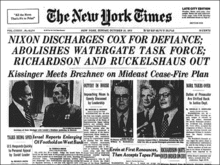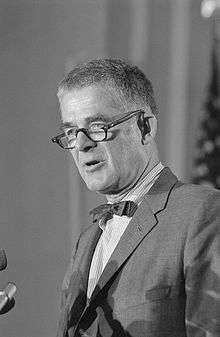Saturday Night Massacre
| Watergate scandal |
|---|
| Events |
| People |
|
Watergate burglars |
|
Judiciary |
|
Intelligence community |
The Saturday Night Massacre refers to U.S. President Richard Nixon's orders to fire independent special prosecutor Archibald Cox, which led to the resignations of Attorney General Elliot Richardson and Deputy Attorney General William Ruckelshaus on October 20, 1973, during the Watergate scandal.[1][2]
History
U.S. Attorney General Elliot Richardson had appointed Cox in May, after promising the House Judiciary Committee that he would appoint a special prosecutor to investigate the events surrounding the break-in of the Democratic National Committee's offices at the Watergate Hotel in Washington, D.C., on June 17, 1972. The appointment was created as a career reserved position in the Justice department, meaning it came under the authority of the attorney general who could only remove the special prosecutor "for cause", e.g., gross improprieties or malfeasance in office. Richardson had, in his confirmation hearings before the U.S. Senate, promised not to use his authority to dismiss the Watergate special prosecutor, unless for cause.[3]
When Cox issued a subpoena to Nixon, asking for copies of taped conversations recorded in the Oval Office, the president refused to comply. On Friday, October 19, 1973, Nixon offered what was later known as the Stennis Compromise—asking the infamously hard-of-hearing Senator John C. Stennis of Mississippi to review and summarize the tapes for the special prosecutor's office. Cox refused the compromise that same evening and it was believed that there would be a short rest in the legal maneuvering while government offices were closed for the weekend.[3]
However, the following day (Saturday) Nixon ordered Attorney General Richardson to fire Cox. Richardson refused and resigned in protest. Nixon then ordered Deputy Attorney General William Ruckelshaus to fire Cox. Ruckelshaus also refused and resigned.[3]
Nixon then ordered the Solicitor General of the United States, Robert Bork, as acting head of the Justice Department, to fire Cox. Both Richardson and Ruckelshaus had given personal assurances to Congressional oversight committees that they would not interfere, but Bork had not. Although Bork later claimed he believed Nixon's order to be valid and appropriate, he still considered resigning to avoid being "perceived as a man who did the President's bidding to save my job".[4] Nevertheless, having been brought to the White House by limousine and sworn in as acting attorney general, Bork wrote the letter firing Cox[5] – and the Saturday Night Massacre was complete.[6]
Aftermath
Initially, the White House claimed to have fired Ruckelshaus,[2] but as an article published the next day by The Washington Post pointed out, "The letter from the President to Bork also said Ruckelshaus resigned."[2]
The night he was fired, Cox's deputy prosecutor and press aides held an impassioned news briefing and read the following statement from him, "Whether ours shall continue to be a government of laws and not of men is now for Congress and ultimately the American people."[7]
On November 14, 1973, federal district judge Gerhard Gesell ruled firing Cox was illegal absent a finding of extraordinary impropriety as specified in the regulation establishing the special prosecutor's office.[5] Congress was infuriated by what it saw as a gross abuse of presidential power as did many Americans, who sent an unusually large number of telegrams to the White House and Congress in protest.[8][9][10]
Less than a week after the Saturday Night Massacre, an Oliver Quayle poll for NBC News showed that, for the first time, a plurality of U.S. citizens supported impeaching Nixon, with 44% in favor, 43% opposed, and 13% undecided, with a sampling error of 2 to 3 per cent.[11] In the days that followed, numerous resolutions of impeachment against the president were introduced in Congress.
But the House Judiciary Committee did not approve its first article of impeachment until July 27 the following year – more than nine months after the Saturday Night Massacre – when it charged Nixon with obstruction of justice. Two more articles of impeachment quickly followed.
Nixon resigned less than two weeks later, on August 8, 1974.

 Front page of The New York Times, October 21, 1973, announcing the dismissal of Cox and the departure of Richardson and Ruckleshaus
Front page of The New York Times, October 21, 1973, announcing the dismissal of Cox and the departure of Richardson and Ruckleshaus
Impact and legacy
Nixon was compelled to allow Bork to appoint a new special prosecutor. Bork chose Leon Jaworski. There was a question whether Jaworski would limit his investigation to the Watergate break-in or follow Cox's lead and look into other corrupt activities, such as those involving the "White House Plumbers".[12] Continuing Cox's investigation, Jaworski did look at broader corruption involving the White House.[13]
While Nixon continued to refuse to turn over the tapes, he agreed to release transcripts of a large number of them. Nixon said he did so partly because any audio pertinent to national security would have to be redacted from the tapes. There was further controversy on November 7 when an 18½-minute portion of one tape was found to have been erased. Nixon's personal secretary, Rose Mary Woods, said she had accidentally erased the tape by pushing the wrong foot pedal on her tape player while answering the phone. Later forensic analysis determined that the tape had been erased in several segments—at least five, and perhaps as many as nine.[14]
Nixon's presidency succumbed to mounting pressure resulting from the Watergate scandal and its cover-up. Faced with almost certain impeachment and conviction, Nixon resigned.
In his posthumously published memoirs, Bork claimed Nixon promised him the next seat on the Supreme Court following Bork's role in firing Cox. Nixon was unable to carry out that promise. But President Ronald Reagan nominated Bork for the Supreme Court in 1987, though he was rejected by the Senate.[15]
The Ethics in Government Act of 1978 was a direct result of the Saturday Night Massacre.[16]
References
- ↑ "Pres. Nixon's Press Secretary Ron Ziegler reading a statement" (audio only). CriticalPast. October 20, 1973.
- 1 2 3 Kilpatrick, Carroll (October 21, 1973). "Nixon Forces Firing of Cox; Richardson, Ruckelshaus Quit". The Washington Post. Retrieved October 2, 2009.
- 1 2 3 Watergate (VHS). Volume 2: The Conspiracy Crumbles. Episode 4: Massacre. Discovery Channel. 1994. OCLC 37028979.
- ↑ Noble, Kenneth B. (July 2, 1987). "Bork Irked by Emphasis on His Role in Watergate". The New York Times.
- 1 2 Noble, Kenneth B. (July 26, 1987). "New Views Emerge Of Bork's Role in Watergate Dismissals". The New York Times.
- ↑ "Nixon Fires Cox; Richardson Quits". The Vindicator. Youngstown, Ohio. Associated Press. October 21, 1973.
- ↑ Oelsner, Lesley (October 21, 1973). "Cox Office Shut On Nixon's Order". The New York Times.
- ↑ "Record Numbers Jam Western Union". McClatchy Newspapers Service and UPI. The Modesto Bee (Modesto, California). p. A2. "Western Union today reported a record 71,000 telegrams received in its Washington office about the firing [of] Watergate special prosecutor Archibald Cox in the first 36 hours ..."
- ↑ "You Can Cheaply Wire (Cable) The White House". The Modesto Bee (Modesto, California). October 22, 1973. p. A2. "... special flat rate for public opinion messages to Washington, D.C. ... up to 15 words, can be sent by dialing 1-800 ... $1.25 charge for the telegram is then billed to the calling person's telephone number ..."
- ↑ "Impeachment Mail Floods Congress". Gadsden Times (Gadsden, Alabama). October 24, 1973. p. 2. "... Sen. Barry Goldwater, R-Ariz., had 270 telegrams for impeachment and about a dozen against it with telephone calls more evenly divided in sentiment. Sen. John G. Tower, R-Tex., reported 275 telegrams against Nixon, 16 for him;..."
- ↑ "Poll Shows Many for Impeachment". Associated Press. Spokane Daily Chronicle. October 23, 1973. p. 14. "... shows 44 per cent favored impeaching Nixon. Forty-three per cent opposed impeachment and 13 per cent were undecided, according to the poll…built-in sampling error of 2 to 3 per cent ..."
- ↑ Evans, Rowland; Novak, Robert. "Nixon Hoping Jaworski Will Drop Plumber Probe". Pittsburgh Post-Gazette. November 6, 1973. p. 6.
- ↑ Evans, Rowland; Novak, Robert. "Jaworski: In Cox's footsteps". The Free Lance–Star (Fredericksburg, Virginia). November 19, 1973. p. 4.
- ↑ Clymer, Adam. "National Archives Has Given Up on Filling the Nixon Tape Gap". The New York Times. May 9, 2003. Archived from the original on September 1, 2010.
- ↑ "Bork: Nixon Offered Next High Court Vacancy in '73". ABC News. February 25, 2013. Archived from the original on March 1, 2013 – via Yahoo! News.
- ↑ Schoen, Douglas E. (2016). The Nixon effect : how Richard Nixon's presidency fundamentally changed American politics. New York: Encounter Books. p. 284. ISBN 1594038007. OCLC 891619019.